Putting life back in your hands: #KnowTheFeeling of nerve damage, ‘pamamanhid’ and ‘tusok-tusok’

MANILA, Philippines — Have you ever wondered how your hands effortlessly perform everyday tasks with precision and coordination? From typing on a keyboard to gently holding a loved one's hand, our hands allow us to experience the world around us with all its joys, sensations and challenges.
Behind all these experiences is an intricate network of nerves that communicate within our bodies and make it possible for us to touch, feel and manipulate the world around us. Yet, despite the profound impact they have on our daily lives, nerve health is not given much importance.
The reason for this, according to Aalok Agrawal, senior vice president - Asia Pacific, Middle East and Africa (AMA) for Personal Healthcare at Procter & Gamble Health, is because neuropathy, more commonly known as nerve damage, is a condition that is not understood, and it's also not perceived as a public health concern.
“There's a lot of discussion around heart health, respiratory health, but very rarely do you hear about nerve health,” he said.
This is why every month of May, the world now observes Neuropathy Awareness Week, which aims to shed light on the importance of nerve care, the impact of peripheral neuropathy in our lives and why there’s a need for the world to talk about this public health concern.
By the numbers: Nerve health is a concern
During a media roundtable on neuropathy led by P&G and participated by various health experts, it was highlighted that is a very complex health problem that has so many dimensions.
In terms of causes, it could be linked to a myriad of reasons—from modifiable to non-modifiable. Here are quick numbers mentioned during the roundtable:
- 1 in 10 people and one in two diabetics: Estimated to suffer from peripheral neuropathy.
- 80% of these patients remain undiagnosed and are suffering from painful symptoms. These symptoms are often not reported, as patients are not aware that these could be serious or that these could be treated.
Additionally, a 2020 P&G consumer study conducted with a sample size of 240 men and women from Metro Manila also reported that 99% of the respondents aged 35 and up answered that they have experienced at least one of the two common symptoms of peripheral neuropathy: pamamanhid and tusok-tusok.
Signs to be aware of

At the roundtable, experts also noted that nerves can be regenerated at a certain point, hence early recognition of nerve damage is essential so proper treatment can be given so as not to progress to neuropathic pain.
This is why raising awareness is a must, according to Dr. Freynhagen. In many cases, he said, patients are symptomatic long before routinely performed examination reveals abnormalities and they know their diagnosis.
Here are some common signs to look out for:
- Tusok-tusok or tingling/prickling sensation: This is characterized by a prickling sensation from pins and needles that you can feel on your hands and feet.
- Pamamanhid or numbness: This usually occurs on the hands and feet, where patients may experience a lack of sensation
RELATED: Pangangalay at pamamanhid? Try this nerve self-checklist!
These symptoms can manifest into various inconveniences that may lead to affecting the quality of life, making it more important that intervention takes place earlier. So, if you are starting to feel these sensory abnormalities, there is still hope in knowing that nerves can still be regenerated.
The next step you should do is to consult your doctor and describe your experience so they could come up with the correct treatment for peripheral neuropathy.
Dealing with nerve problems
As with many health concerns, education is still the key when it comes to dealing with nerve problems. So, what can help the general public be aware of this?
- Monitoring weight, blood sugar levels: Obesity and blood sugar are often mentioned in the discussion of neuropathy, specifically diabetic neuropathy.
This means that keeping your blood sugar controlled is highly essential and addressing neuropathy early. Part of doing this is incorporating fruits, green, leafy and fiber-rich foods as well as whole grains and lean proteins into your diet.
- Heavy and continuous drinkers: Straying away from alcohol use can help reduce the risk of neuropathy. Alcohol misuse leads to loss of B vitamins.
- Neuropathy induced by Vitamin B deficiency: It always pays to make sure that your body is receiving the nutrients it needs. Vitamin B deficiency, in particular, is often linked to nerve problems. Why is this so?
As mentioned by Dr. Inna Eiberger, Global Medical Leader at P&G Nerve Care Franchise, three B vitamins are essential in keeping nerves healthy: Vitamins B1, B6 and B12.
- Vitamin B1 helps provide energy to the nerves
- Vitamin B6 helps signal transmissions, and
- Vitamin B12 helps support nerve regeneration
Proper supplementation of neurotropic B Vitamins
Putting life back in your hands is possible, with proper supplementation of B Vitamins together with early intervention and a healthy lifestyle.
The leading nerve care expert in the world, Vitamins B1+B6+B12 (Neurobion), highlights the importance of nerve health awareness and proper nerve care. Regular intake of Vitamins B1+B6+B12 (Neurobion) can help stop recurring pamamanhid and tusok-tusok from bothering you again, with proper diet and exercise.
If you’re dealing with symptoms of peripheral neuropathy, don’t lose hope. Consult your doctor about your condition and ask how Vitamins B1+B6+B12 (Neurobion), along with proper diet and exercise, can help #PutLifeBackInYourHands.
If symptoms persist, consult your doctor.
ASC REFERENCE CODE: P0144P072523N




















